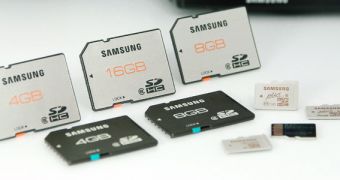Looks like the level of data security displayed by today's memory cards is not exactly at the level people, or some of them, want it to be, so five major players in this field decided to do something about it.
“Next Generation Secure Memory Initiative” is what Panasonic, Samsung, SanDisk, Sony and Toshiba have begun collaborating on.
This is a content protection solution that should safeguard HD video contend and applications like HD Digital Copy/Managed Copy from Blu-ray Disk.
Basically, the five are looking into public key infrastructure-based copy protection and special ID (identification) technology for NAND Flash memory.
“Samsung believes that the time is ripe for an advanced security solution and welcomes the opportunity to deliver a highly viable solution using flash memory chips,” said Young-Hyun Jun, Executive Vice President, Memory Business, Samsung Electronics. Co., Ltd.
“Samsung's ongoing commitment to technology excellence will now further extend to early market availability of high-performance NAND technologies implementing the new advanced security solution.”
SD cards and embedded memory used in tablets, smartphones and other advanced consumer applications are supposed to benefit from this alliance.
What is just as relevant is that the five companies want to work fast and start licensing the “Next Generation Secure Memory” as early as Q1-Q2 next year (2012).
“This technology will open a new door to flash memory applications,” said Yasuo Naruke, Corporate Vice President, Vice President, Memory Division, Semiconductor & Storage Products Company, Toshiba Corporation.
“As a flash memory manufacturer, we are pleased that our flash memory technology will contribute to bringing people more convenient and exciting experiences of HD content. We will continue our development efforts to create surprising innovation.”
The companies will offer a better name for their new project at some point in the, probably near, future (“Next Generation Secure Memory Initiative” is only the tentative name).

 14 DAY TRIAL //
14 DAY TRIAL //